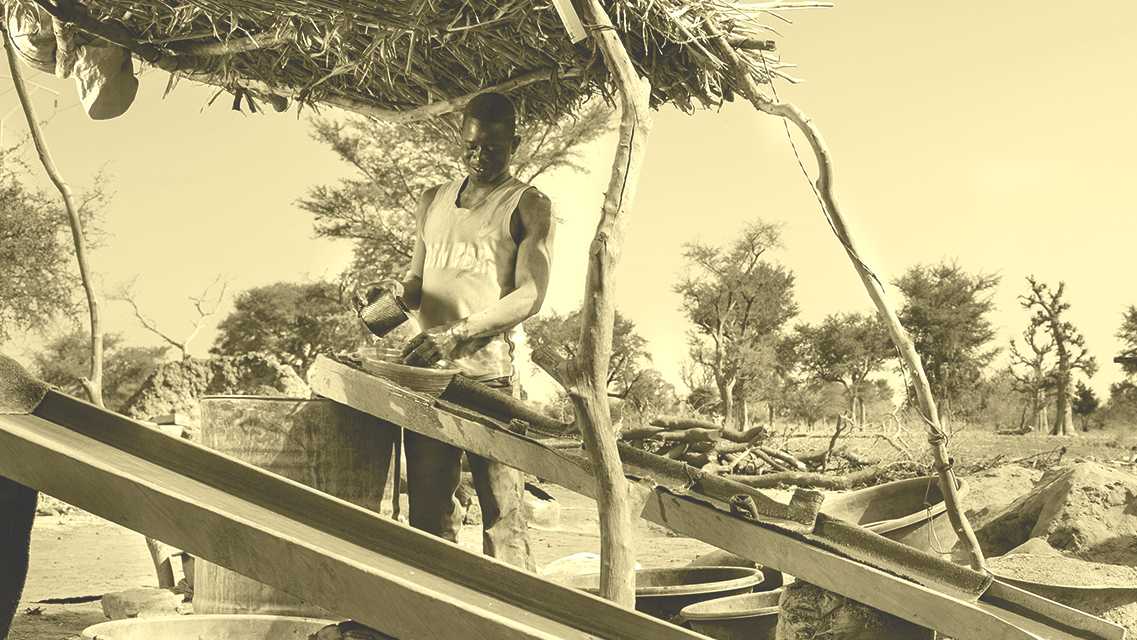Responsible Gold Mining

Gold is a unique metal with high direct consumer demand for investment, jewellery, and various industrial uses. Most gold is extracted by industrial mines. Unfortunately, due to weak governance in many countries the environmental and social impacts of these mines are not sufficiently regulated. Additionally, an estimated 16 million artisanal gold miners, who have been associated with human rights abuses and environmental degradation, and often operate outside the government’s control, extract up to 20% of all gold. Moreover, due to its high recyclability, about one-third of gold is extracted from secondary sources.
Various research projects focus on multiple issues across the gold supply chain, from extraction to consumption. We used satellite images and federal data to study the impact of artisanal gold mines in Burkina Faso on the households around them. In addition, we conducted surveys, biometric sampling, and a field experiment on four artisanal mines in Burkina Faso to understand how miners protect themselves against mercury poisoning. We then analyzed the supply chains of gold and mercury and how respective value and financial flows are embedded within local and transnational trading networks. Lastly, by conducting a qualitative case study we identified current opportunities and barriers for formalization and the adoption of responsible sourcing practices.
Further down the supply chain, we conducted randomized controlled trials and surveys in Switzerland to understand the drivers of e-waste recycling, to increase the amount of gold sourced from secondary sources and alleviating pressure on primary resources.
Researchers: Isabel Günther, Fritz Brugger, Antoinette van der Merwe
Alumni: Joschka J. Proksik, Erwin Lefoll
Publications
Van der Merwe, A., Brugger, F. and Günther, I., 2023, external page Rising Gold Prices but Lower Incomes for Gold Miners: Evidence on Market Imperfections from Burkina Faso during COVID-19, Journal of African Economies, Volume 33.
Van der Merwe, A., Cabernard, L. and Günther, I., 2023, external page Urban mining: The relevance of information, transaction costs and externalities, Ecological Economics, Volume 205.
Bugmann, A., Brugger, F., Zongo, T. and van der Merwe, A., 2022, external page “Doing ASGM without mercury is like trying to make omelets without eggs”. Understanding the persistence of mercury use among artisanal gold miners in Burkina Faso, Environmental Science & Policy, Volume 133.
Van der Merwe, A., 2022, Towards responsible gold supply chains: A case study from Burkina Faso to Switzerland.
Van der Merwe, A. and Brugger, F., 2021, external page Case study: The digital device life cycle: From mining to e-waste, in: OECD, Development Co-operation Report 2021: Shaping a Just Digital Transformation, p.204-210.
Brugger, F. and Zanetti, J., 2020, external page “In my village, everyone uses the tractor”: Gold mining, agriculture and social transformation in rural Burkina Faso, The Extractive Industries and Society, Volume 7.
Bezzola, S., Günther, I., Brugger, F., & Lefoll, E., 2022, external page CSR and local conflicts in African mining communities. World Development, Volume 158.
Bezzola, S., Brugger, F., Günther, I., & Sebhatu, D., 2022, external page Do social investments by mining companies harm citizen-state relations? Experimental evidence from Burkina Faso. The Journal of Development Studies, Volume 58.
Van der Merwe, A., Ruppen, D., Brugger, F., Konkobo, H. M., & Günther, I., 2025, external page Protective behaviour on artisanal gold mines: the relevance of knowledge, risk perception and access to equipment. The Extractive Industries and Society, Volume 23.
Lefoll, E., van der Merwe, A., & Günther, I., 2025, external page Does responsible gold certification enhance transparency? The knowledge and communication of jewellers. In P. Kenel, P. Sawall, L. Pfeifer, U. Bettig, & J. Michel (Eds.), Fair Fashion? Interdisciplinary Perspectives in the Context of Social, Ecological, Economic and Cultural Sustainability, p. 121–141.
Policy Briefs
Van der Merwe, A., Certified Gold: too many schemes and not enough demand, 2021.
Van der Merwe, A., & Günther, I., Old mobile phones: A potential gold mine, 2020.
Van der Merwe, A., A blockchain is only as strong as its weakest link: transparency and artisanal gold, 2020.
Research Materials
Material developed to give artisanal miners information on how to protect themselves from mercury poisoning, click here